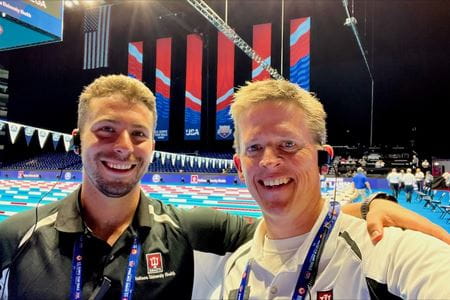The first time Zachary Wagner visited Indianapolis, there was chlorine in the air.
As a top high school swimmer from Seattle, he was eager to compete against national talent at the Indiana University Natatorium. More than 200 American records and 15 world records have been set in the competition pool on the campus of IU Indianapolis.
This month, the action is a short jog south at Lucas Oil Stadium, where an Olympic-sized pool has been built inside the home of the Colts for the 2024 Olympic Trials in Swimming. Wagner will be there as part of the IU Health medical team led by faculty with the Department of Family Medicine at the IU School of Medicine.
“It’s definitely nostalgic,” said Wagner, a resident physician training in family and sports medicine. “I know what the swimmers are going through.”
Wagner’s first meet in Indianapolis was at the Nat in 2012. Michael Phelps was among the competitors.
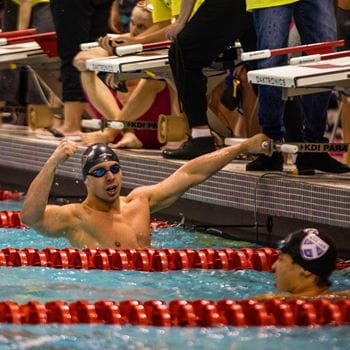 “I knew a lot of guys in that era and trained with (Olympians) Matt Grevers and Brad Tandy,” said Wagner.
“I knew a lot of guys in that era and trained with (Olympians) Matt Grevers and Brad Tandy,” said Wagner.
As a freestyler, he was a six-time high school state champion in Washington, a 12-time NCAA All American and an NCAA Academic All American who swam for the University of Southern California and won an NCAA championship with Denison University (Granville, Ohio). Wagner competed in the Olympic Trials in 2016 and placed at Nationals in 2017 and 2018.
“The Olympics was always in mind,” he said.
Back then, Wagner had to squeeze school around a full-time training regimen. These days, he’s squeezing swimming into his full-time schedule as a medical resident. Wagner retired from competitive swimming six years ago and earned his Doctor of Osteopathic Medicine degree from Pacific Northwest University of Health Sciences.
Now he’s back in Indianapolis — and back in the water — as a member of the Indy Aquatic Masters, a competitive swimming club for adults. Wagner starts most days at 4 a.m. and heads to the Nat for early morning training sessions. He’s joined by other Masters swimmers, including Stephen Hartsock, MD, a faculty member with IU’s Primary Care Sports Medicine Fellowship.
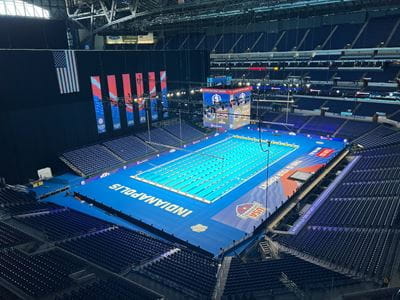 A physician with USA Swimming since 2008, Hartsock is now serving as medical director for the Olympic Trials.
A physician with USA Swimming since 2008, Hartsock is now serving as medical director for the Olympic Trials.
“When I was a fellow (at IU), the world championship was held here right after the 2004 Olympics, and I worked that meet,” Hartsock said. “The next year, I was traveling with USA Swimming. I’ve been to Worlds in Doha (Qatar) 10 years ago. Last year, I was medical director for U.S. Nationals in Indy, and I was medical director for the 2022 World Cup race that was in Indianapolis. It’s rarely in North America, so that was a big deal.”
This month, USA Swimming expects to break the world record for the largest attendance at a meet. Hartsock has no doubts that 30,000 fans will fill the seats at Lucas Oil Stadium as Team USA is finalized June 15-23.
“This is the biggest and fastest meet in the world,” he said.
Team medicine helps Team USA
IU’s sports medicine trainees work alongside Hartsock as part of the medical team at the Trials. The team includes physicians, physical therapists, athletic trainers and other health care professionals.
Wagner’s interest in sports medicine grew out of his own experiences as an elite swimmer pushing his body to its limits. Two months before the 2016 Olympic Trials, he herniated three discs in his back while weightlifting. Over the years, he’s also suffered shoulder and ligament tears and received regenerative therapy for his knees.
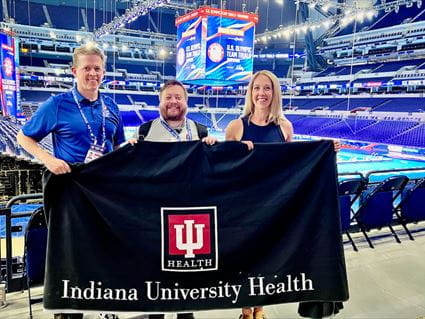 “A lot of these swimmers are training the hardest they have in their life,” he said of the athletes converging in Indianapolis, each hoping to capture a place on Team USA. “When you’re training eight hours a day and lifting really heavy, injuries are bound to happen.”
“A lot of these swimmers are training the hardest they have in their life,” he said of the athletes converging in Indianapolis, each hoping to capture a place on Team USA. “When you’re training eight hours a day and lifting really heavy, injuries are bound to happen.”
Although major injuries are rare at swim meets, Hartsock’s team treated a dislocated shoulder at the World Cup. Most of the time, however, the medical team is doing primary care. For the Trials, the Colts coaches’ locker room has been transformed into a medical clinic.
“The athletes are here for a nine-day meet and come early to get used to the pool, so we see things like stuffy noses,” Hartsock said. “Although there’s usually not anything surgical going on, we have orthopedic surgeons on call. And we have dental and ophthalmology.”
Athletic trainers can apply ice and perform therapeutic massage. Wagner is trained in Osteopathic Manipulative Treatment, or OMT, which uses hands-on techniques aimed at restoring function to muscles, joints and soft tissues — enhancing performance without medications.
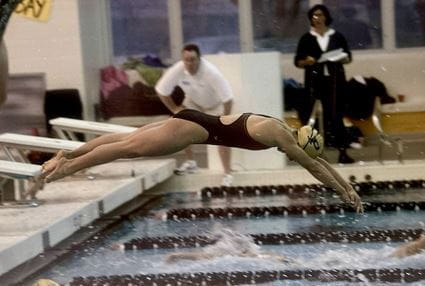 “The majority of injuries in swimming are related to overuse (of muscles),” said Kimbre Zahn, MD, a family medicine faculty member with IU’s Sports Medicine Fellowship. “Risk factors include overtraining, inadequate recovery, poor technique, muscular imbalances and weakness, and hypermobility.”
“The majority of injuries in swimming are related to overuse (of muscles),” said Kimbre Zahn, MD, a family medicine faculty member with IU’s Sports Medicine Fellowship. “Risk factors include overtraining, inadequate recovery, poor technique, muscular imbalances and weakness, and hypermobility.”
A former collegiate swimmer for Purdue University, Zahn is serving alongside Hartsock as assistant medical director for the Olympic Trials. The first time she watched the Trials at the Nat, she was 11. She sat behind the parents of Olympic gold medalist Amy Van Dyken and secured the swimmer’s autograph.
This year’s competition will include IU alum Lilly King, a world champion and Olympic gold medalist breaststroker. A total of 1,007 men and women from throughout the nation qualified for the Trials. Just 52 of them will represent Team USA in Paris.
“It’s impressive to see how far the sport has come and awesome to be in a stadium as large as Lucas Oil,” Zahn said.
Treating athletes of all sports
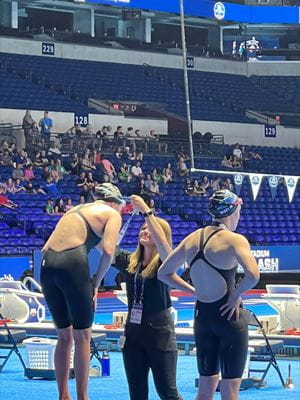 Zahn credits her swim team experience with instilling a broader love of health and fitness. In her current role as team physician for IU Indy Athletics, Zahn works with all of the university’s teams. This gives IU’s sports medicine trainees the opportunity to come alongside and learn about the different types of injuries common to each sport.
Zahn credits her swim team experience with instilling a broader love of health and fitness. In her current role as team physician for IU Indy Athletics, Zahn works with all of the university’s teams. This gives IU’s sports medicine trainees the opportunity to come alongside and learn about the different types of injuries common to each sport.
Other faculty members bring connections with Indianapolis Indians baseball, the Indianapolis AlleyCats ultimate frisbee team, Indy Fuel ice hockey and other local teams. Arnold Henry, MD, director of the Primary Care Sports Medicine Fellowship, is the medical director for the Indiana Golden Gloves boxing club, which annually hosts a state tournament.
In September, Hartsock will take IU’s sports medicine fellows to Lake Michigan for the Big Shoulders open water swim.
“I used to swim in the race when I lived up in Chicago but don’t do it anymore — the water’s too cold,” Hartsock said. “I’m not acclimated.”
Wagner, however, will brave the chilly water of Lake Michigan in September as part of his first Ironman competition. Along with training in the pool, he prepares for the challenge with early-morning bike rides and runs throughout the week.
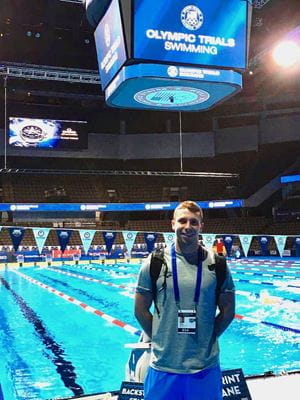 “I was a sprinter as a swimmer, so I’m trying to see what my body has to go through to shift to being a super long-distance athlete and win my age group,” Wagner said.
“I was a sprinter as a swimmer, so I’m trying to see what my body has to go through to shift to being a super long-distance athlete and win my age group,” Wagner said.
He has momentum going into the contest. In his first Masters meet, he set a state record in freestyle and won all six of his events.
Although Zahn no longer swims competitively, she knows her athletic experiences helped shape the family and sports medicine doctor she has become.
“There are a lot of benefits to being an athlete on a team — a lot of life lessons in regard to hardships, struggles, barriers to success or not reaching goals, learning sportsmanship and how to get along with people,” Zahn said. “As physicians, working hard as part of a team helps us be successful for our patients.”
